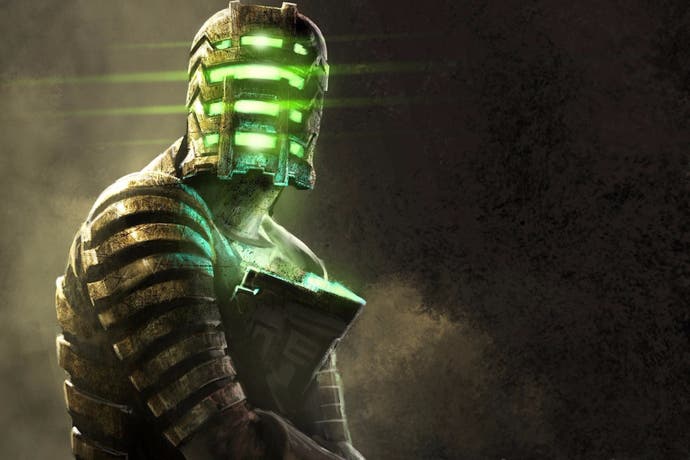Dead Space is the sequel Resident Evil 4 deserved
From the archive: Extra terrors trial.
Editor's note: In light of EA closing Visceral Games, we thought it would be a good time to remember the game and series the studio is known best for: Dead Space. This article was first published in February this year.
My initial plan for this article was to write about the space bits of Dead Space, also known as everyone's favourite bits of Dead Space. I was going to write something cool and arch and critical like "the true horror of Dead Space lies not in the snarling, gibbering Necromorphs that attempt to rip and tear the flesh from Isaac Clarke's body, but in how the game imagines the inky void of space as a direct physical threat. Throughout its length, Dead Space constantly reminds us the USG Ishimura is a tiny lifeboat spinning in a vast, black vacuum. It sucks the air out of Isaac's lungs, and forces us to fight in environments where even simple things like the concept of 'Up' become entirely redundant."
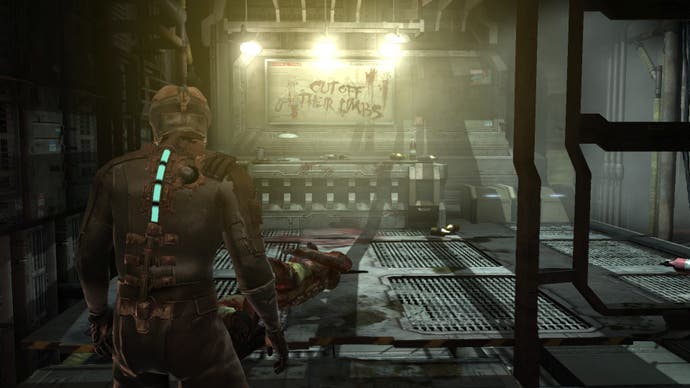
Something like that anyway. But then I played Dead Space, which I haven't done in about five years. I arrived at the first jump-scare, the one where Isaac is separated from his crewmates in the docking bay as Necromorphs start falling from the ceiling like coconuts on the galaxy's worst tropical island. I wish I could tell you that I was stalwart in the face of danger, hardened by my years playing horror games in the name of games journalism. Instead I completely bricked it. Again. I'd prepared myself mentally for it as well, playing the scene over in my head as the game downloaded. It made no difference. The moment Dead Space dropped the NecroMic I panicked, racing blindly through the corridors, fingers stabbing at the wrong keys, swearing with increasing volume as I tried to get the goddamn elevator doors to shut.
So now before I can write about the space bits of Dead Space, I have to write about the dead bits of Dead Space. Because no matter how hard you try, you cannot ignore the Necromorphs. They're persistent like that.
There's a part of me that feels guilty about liking the Necromorphs, because they are enormously obnoxious. They have knives for arms. Their insides are their outsides. When you CUT OFF THEIR LIMBS, as instructed by a bloody scrawl near the game's commencement, fountains of blood spew from the stump, and worm-like parasites writhe in the exposed flesh. It's as if the developers watched John Carpenter's The Thing and thought it was all about the cool animatronics, rather than the tension of not knowing who to trust.
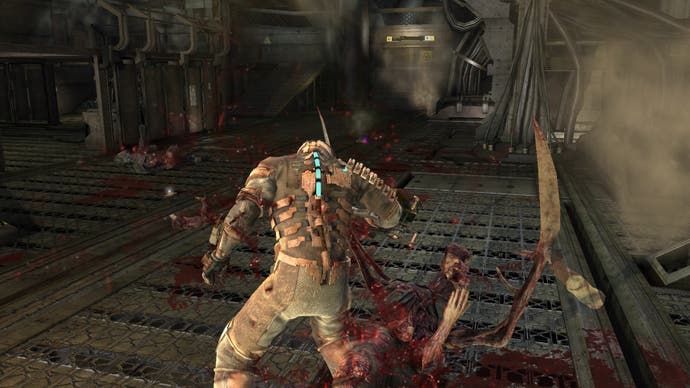
The problem with this is they're also exceptionally designed, particularly when it comes to animation. Anybody can draw a monster, but to make that monster move in a way that makes your flesh creep, in that twitchy, unpredictable way the Necromorphs do, is another matter. To then do that when they've got one leg, one arm, no arms, that takes real talent. Dead Space excels at making you fear these things, even when they're three limbs down on you.
The craft behind the Necromorphs makes it very difficult for me to criticise them for being garish. It's hard to say "that's a bit on the nose," when you're trying to stop a Necromorph from biting off your nose. It's a notion that can be applied to the game in general. Dead Space is entirely shameless in both concept and execution, but it works at its ideas (and other games' ideas) to the point where said shamelessness no longer matters.
For proof of this, you need look no further than the basic premise. Dead Space is Resident Evil 4 in space. There's no point trying to deny it, even the developers happily acknowledge it. In a recent interview with PC Gamer, Visceral Games (then EA Redwood) explain that they initially intended to make System Shock 3. Then they played Resident Evil 4 and immediately reimagined the game as a third-person action horror. It was an entirely deliberate decision. But the change in approach also meant they had to sell a new IP to EA, and to do that they had to make Resident Evil 4 in space excellent.
Consequently, what you get is a catalogue of smart ideas thrown at you in quick succession. The game's HUD is baked into the game world, making it a core part of the experience rather than a thing that pulls you out of it. The dismemberment mechanic turns gratuitous violence into simple pragmatism, while also setting Dead Space apart from Resident Evil 4 where headshots remain king. Even the stasis and kinesis abilities, mechanics obviously borrowed from other games, are intelligently worked into Dead Space's fiction.
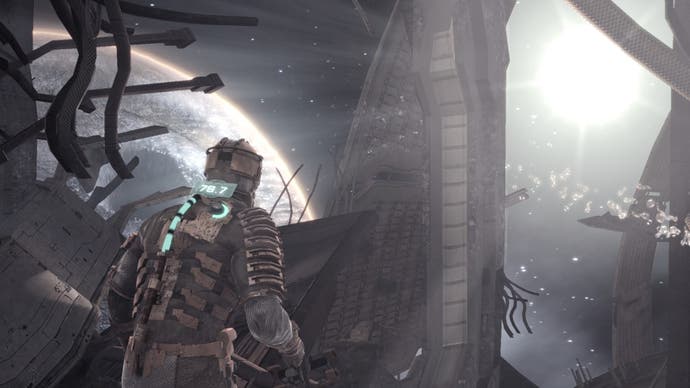
The cohesiveness of Dead Space is one of the main reasons behind its success. Isaac Clarke's role as an engineer is used by the game to great effect. You spend most of your time travelling around the Ishimura desperately attempting to repair its core systems, and use your engineering tools to slice enemies apart with surgical precision. This is complemented by the Ishimura's pleasing internal logic. Each chapter of the game takes place in a specific area of the ship, all of which perform an essential function that the Necromorphs have somehow rendered dysfunctional. You can also see traces of System Shock's DNA in the Ishimura's layout too. The initial area you explore beyond the opening is the Medical bay, a direct reference to the Med/Sci deck of System Shock 2.
Then, of course, there are the space bits of Dead Space, areas of the ship where the artificial gravity has malfunctioned, leaving corpses and detritus gently drifting, or where an explosion has left the ship's interior exposed to the cold vacuum of space. Occasionally it's both, and in these moments the dread really sets in. Isaac is left virtually deaf, with just ninety seconds of oxygen in his suit, in an environment where attack can come from literally any direction.
What I particularly like about these moments is Visceral didn't need to do them and could so easily have overdone them. Instead, it's the one aspect of the game where they show restraint, and so you never quite get used to them. There is some truth to the idea that these sections are the crux of Dead Space's horror. Although you may become steeled against the relentless Necromorph attacks, stepping into an area with zero gravity or zero air is always cause for trepidation. It immediately throws you off guard, making you that much more vulnerable. Moreover, you can fight the Necromorphs directly, slice them to pieces, stamp on their twisted faces. But you can't fight space. You can only survive it, and there's nothing more frightening than being forced to confront your own helplessness.
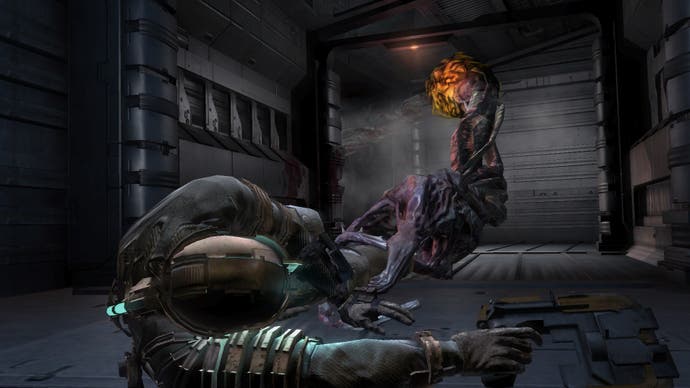
These little ideas so intensely worked are what set Dead Space apart from the game it is so openly inspired by. Sometimes though, it works them a bit too much. One of Dead Space's biggest problems is that the starting weapon - the Plasma Cutter, is too good. It is perfectly suited to the job of carving up Necromorphs, and while there are a couple of fun alternatives, such as the Line Gun and the Ripper, none of them have the Plasma Cutter's delicate balance of punch and precision. The story, too, is polished to the point of being a little bland. It has all the snap and pace of a Hollywood Blockbuster, but never stops to think of anything memorable to say.
Having recently played Resident Evil 7, I wondered whether it was time for Visceral to dust off Isaac Clarke's rust-coloured bodysuit, which is what drew me back to it in the first place. But the truth is that, even though it received two of them, Dead Space never needed a sequel. Partly this is because, despite being almost a decade old, it feels as if it could have been released yesterday. But mainly it's because Dead Space is essentially a sequel itself.
It's often lamented that Resident Evil 4 never received the follow-up it deserved. Resi 5 and 6 have their defenders, but they're not in the same league as Mikami's masterpiece. I think there's a case to be made that Dead Space is that sequel. Civilization developers Firaxis has a theory that a sequel should be one third old, one third changed, and one third new. With regard to Resident Evil 4, Dead Space hits those markers almost exactly. It builds on the ideas of Capcom's game, and even fixes a few of the problems, such as Resi's notoriously terrible dialogue. For a game that set out with the premise of deliberately aping one of the best games of all time, I'd struggle to think of a better accolade.
